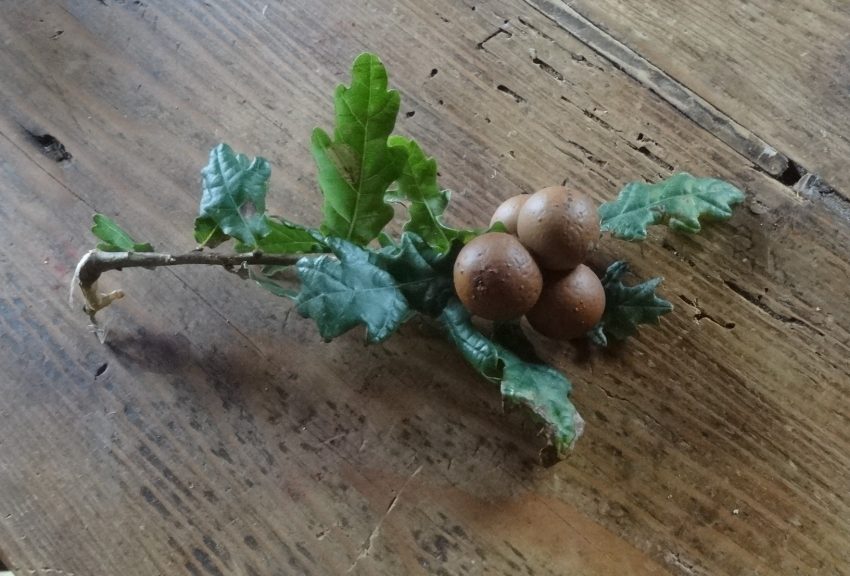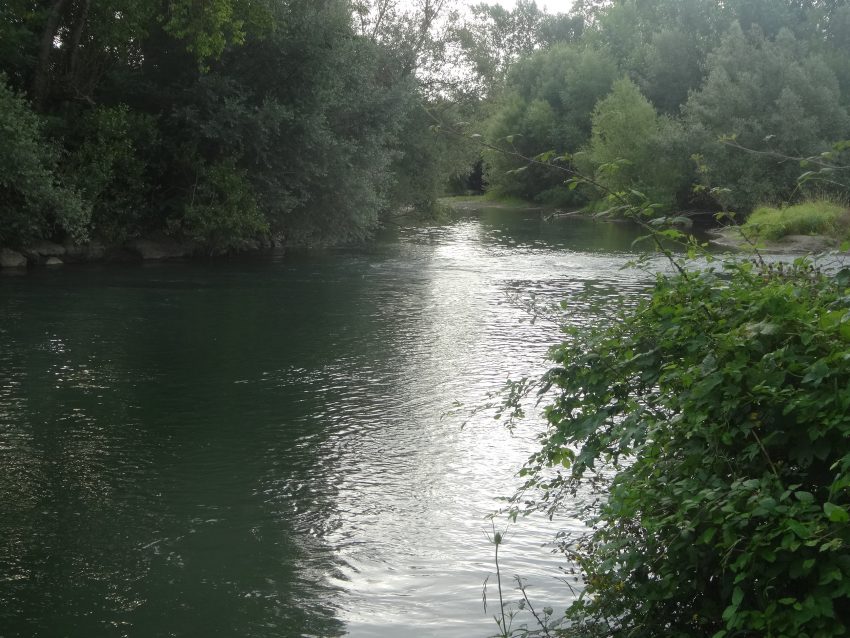Walking to the river
‘Look! ‘I said as John and I walked to the river. ‘Oak apples!’

I stopped surprised at myself. ‘How do I know that’s what they are? How did I recognise them?’
I’m not English, I haven’t ever lived in the English countryside and I haven’t spent that many years in Europe. Where did that piece of knowledge come from? Walks in the countryside? A friendship with someone who had once been a shepherd? Or, most likely, a childhood in the company of Enid Blyton?
‘Oak Apple Day.’ contributed John.
‘What is Oak Apple Day about?’ I asked. John wasn’t sure but we both thought of King Charles, the apple of the cavaliers and his hiding place in the Oak Tree. So I picked the twiglet of oak apples and we did a Google search on our return from the river.

Oak Apples and Ink
Oak apples are galls caused by a tiny wasp. They are surprisingly attractive but the most interesting fact about them is that they are rich in tannin and were used to make oak gall ink with the addition of iron sulphate and gum arabic from Roman times until the twentieth century. Think for a moment about a natural process that begins with an insect egg and is developed by a simple artisanal craft that has made possible the recording of everything we know for hundreds of years as words and musical notations. Isn’t that extraordinary and miraculous?
Oak Apple Day
The 29th May 1660 was declared a public holiday to celebrate the restoration of the monarchy under King Charles the Second who had hidden from the Roundheads in an oak tree near Boscabel House. On this day everyone wore oak leaves. as a symbol of loyalty. This period of history was brought to life by Captain Marryat’s story The Children of the New Forest another book with a theme of nature that meant a great deal to me as a child.
And Enid Blyton and the countryside
Enid Blyton was a writer of her time like all writers are. Like all children, I grew up with books of the time of my childhood. There was an irony in that I lived physically in Africa and imaginatively in an English countryside with bluebells and robins until I was 10 years old. I wonder what Blyton’s stories would have been like if she had lived in colonial Africa? I’m very pleased that I can’t know that. I am very grateful to her, however, for instilling in me a real love of nature which inevitably led to my love for the wild places I’ve been fortunate to experience in Zambia.
Spidermother writes
I’m working on a new novel in which a character known as Spidermother comments:-
I am no longer real.
The moment I type a word onto the screen of my laptop I stop believing in its truth. There are too many words and they arrive so quickly and vanish so easily. When I began to write into the temporary space on a computer screen, when I realised that my immaterial words are stored in a cloud that has no physical presence, I began to realise that I no longer exist.
I want to write with pens that leak and smear and tear at the paper – I want to write down words that smudge when I touch them. I want to write words that I can scratch out with a line or scribble over in a fury.
I tap out the words of my ending and post a smile. At the end of this word. At the end of this page. At this, the ending. What will be left? What can survive? Who might read my words? Who will smooth down the paperless book, close the unmarked laptop and remember me, the ink-less writer of soundless type?
4 Comments on “Oak Apples, Ink and Writing”
Lovely story, so comforting: just looking at nature, instead of reading the latest on today’s crazy world of virus, floods, fires etc. Keep going !!!! See you at choir? Love, sigrid
Thank you Sigrid – yes the world is crazy but it’s lovely to sing and nature will always comfort us. Ruth
Hello Ruth,
Eyal and I have just read this post aloud while waiting for our dinner to finish cooking. It immediately spun me back to my own Enid Blyton days. Bluebells and robins indeed. I also remember the weird shock of recognition when I first drove by an English field, vivid green, with buttercups and lambs in it, and realised that a field wasn’t veld. Writing on the computer feels transitory, but we often forget that computers are also very good at recording. I think many will enjoy this poetic post in future.
Hello Tia and Eyal – strange mythologised childhoods that we had back in those days – but Blyton’s story-telling and love for the natural world transcended those distances and expanded our worlds – you’re right about the endurance of recording by computers but instead of a single recording being sent into space we do have a clamour of billions of stories in the ether – what Margaret Atwood said – ‘in the end we all become stories.